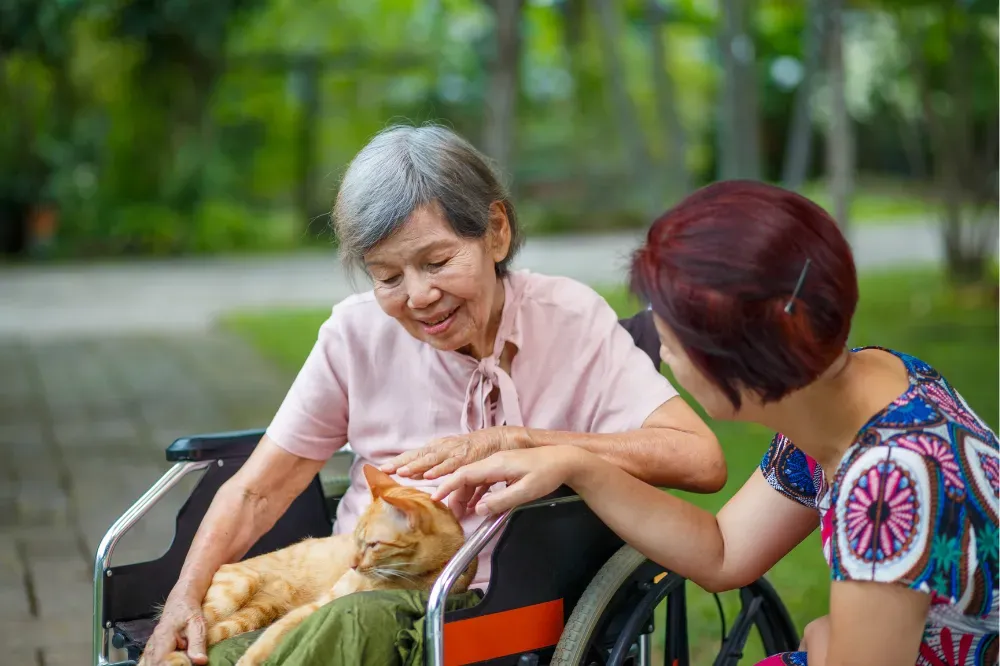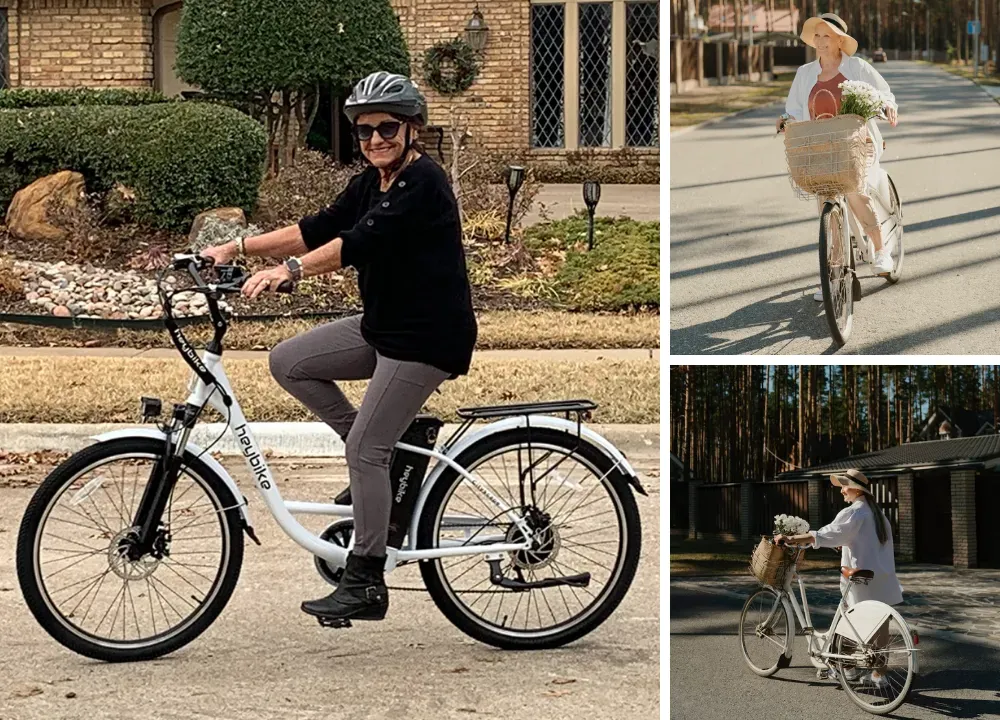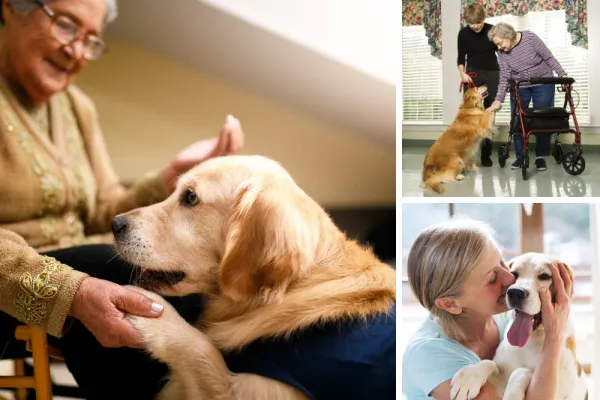As people age, maintaining physical and mental health becomes increasingly important. One of the most rewarding and beneficial ways to enhance well-being during the golden years is through pet ownership. The companionship of a furry friend can bring immense joy and provide numerous health benefits for older adults. This article explores the benefits of pets for seniors, focusing on both physical and emotional aspects.

Emotional Benefits of Pet Ownership for Seniors
1. Reducing Feelings of Loneliness
Loneliness is a common issue among older adults, especially those living alone or with limited social interaction. Owning a pet provides constant companionship, helping to reduce feelings of isolation and loneliness. The presence of a companion animal can offer emotional support, making seniors feel less alone and more connected.

2. Enhancing Mental Health
The mental health benefits of pet ownership are significant. Studies show that interacting with pets can reduce stress, anxiety, and depression. The simple act of petting a dog or cat can release serotonin, a hormone that boosts mood and promotes a sense of well-being. For elderly pet owners, having a pet can be a source of joy and emotional stability, helping to combat common mental health issues in older adults. Additionally, older pet owners may require special assistance during hardships, such as the COVID-19 pandemic, to ensure they have access to pet supplies and veterinary care.
3. Providing a Sense of Purpose
Caring for a pet gives seniors a sense of purpose and responsibility. This daily routine can be especially beneficial for those who are retired or have fewer daily obligations. Knowing that a pet relies on them for care and affection can increase a senior's sense of self-worth and motivation, contributing to a higher quality of life.
4. Social Interaction and Community Engagement
Pets can be great conversation starters and help seniors connect with others. Whether it's chatting with fellow dog owners during walks or participating in pet therapy programs, pets encourage social connections. These positive interactions can help reduce social isolation and promote a sense of community.
Physical Health Benefits of Pet Ownership
1. Increasing Physical Activity
Owning a pet, particularly a dog, encourages regular physical activity. Daily walks, playtime, and other outdoor activities with a pet help seniors stay active and maintain a healthier lifestyle. Increased physical activity can lead to better cardiovascular health, stronger muscles, and improved mobility.

2. Lowering Blood Pressure and Cholesterol Levels
Research shows that pet owners tend to have decreased blood pressure and lower cholesterol levels compared to non-pet owners. The calming effect of being around pets, combined with the physical activity associated with caring for them, contributes to these positive health outcomes. Lower blood pressure and cholesterol levels are crucial for reducing the risk of heart disease, a common concern for older adults.
3. Reducing Stress Levels
The presence of a pet has been shown to reduce stress levels. Engaging in activities like petting, cuddling, or simply spending time with a pet can lower cortisol levels, a hormone associated with stress. Reduced stress can lead to fewer health problems and a more relaxed and enjoyable daily life for seniors.
4. Improving Cognitive Function
Interaction with pets can also benefit cognitive function. Activities like playing with a dog or cat, training them, or even managing their care routines can stimulate the brain and keep it active. For older adults, maintaining cognitive function is vital for healthy aging and can potentially delay the onset of cognitive decline.

Pet Therapy Programs for Seniors
Pet therapy programs have become increasingly popular as a way to bring the benefits of human-animal interaction to seniors who may not be able to own a pet. These programs involve visits from therapy dogs or other companion animals to nursing homes, assisted living facilities, and even hospitals. A therapy dog is a great way to bring joy and comfort to elderly individuals, providing many of the same emotional and physical benefits as owning a pet.

1. Emotional and Physical Benefits
Pet therapy programs offer emotional support and stress relief for seniors, particularly those dealing with chronic health conditions or cognitive decline. The human-animal bond formed during these interactions can have a lasting positive impact on the emotional well-being of older adults.
2. Encouraging Physical Activity
Even brief interactions with therapy animals can encourage seniors to move more, whether it is reaching out to pet a dog, taking short walks, or participating in group activities with the animals. This physical engagement is beneficial for maintaining mobility and overall health.
Choosing the Right Pet for Seniors
Selecting the right pet is crucial to ensure a positive experience for both the senior and the animal. Factors to consider include the senior's lifestyle, physical capabilities, and living situation.

1. Dogs
Dogs are a popular choice for seniors due to their loyalty and companionship. However, it is important to choose a breed with an energy level that matches the senior's activity level. Smaller dogs with moderate exercise needs, such as Shih Tzus or Cavalier King Charles Spaniels, are often a good fit for older adults.
2. Cats
Cats are ideal for seniors who prefer a lower-maintenance pet. They are independent but still offer affection and companionship. Cats are also a great option for seniors with limited mobility, as they require less physical activity than dogs.
3. Small Mammals
For seniors who may not be able to care for a dog or cat, small mammals like rabbits or guinea pigs can provide companionship with less demanding care requirements. These pets are easy to handle and can still offer the emotional benefits of pet ownership.
4. Adopting Older Pets
Adopting an older pet from your local animal shelter can be a great option for seniors. Older dogs or cats are usually more settled and require less training, making them easier to manage. Additionally, senior pets often have lower energy levels, which can be a better match for an older adult's lifestyle.

Conclusion
The benefits of pet ownership for seniors are vast, impacting both emotional and physical health. From reducing stress and lowering blood pressure to providing companionship and a sense of purpose, pets have unconditional love and can greatly enhance the quality of life for older people. Whether through owning a pet or participating in pet therapy programs, the human-animal bond offers valuable support for seniors as they navigate the challenges of aging. By choosing the right pet and engaging in regular interaction, seniors can enjoy the many benefits that pets bring to their lives.













